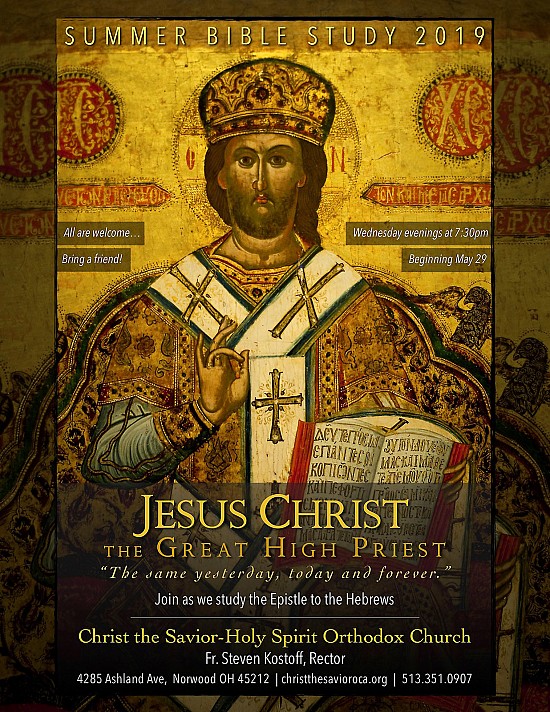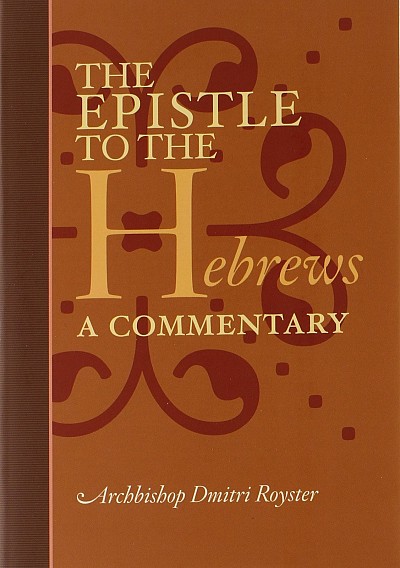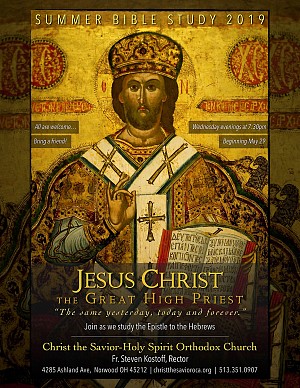ANNOUNCING OUR ANNUAL SUMMER BIBLE STUDY . . .
The Epistle to the Hebrews
by Fr. Thomas Hopko
from The Orthodox Faith
Virtually none of the modern scriptural scholars think that Saint Paul is the author of the letter to the Hebrews. The question of the exact authorship of this epistle was questioned early in Church Tradition with the general consensus being that the inspiration and doctrine of the letter is certainly Saint Paul’s, but that perhaps the actual writer of the letter was one of Saint Paul’s disciples. The letter is dated in the second half of the first century and is usually read in the Church as being “of the holy apostle Paul.”
The letter to the Hebrews begins with the clear teaching about the divinity of Christ, affirming that God, Who “in many and various ways . . . spoke of old to our fathers” has “in these last days . . . spoken to us by a Son, Whom He appointed the heir of all things, through Whom He also created the world” (1.1–2).
He (the Son of God) reflects the glory of God and bears the very stamp of His nature (or person), upholding the universe by the word of His power (1.3).
Christ, the divine Son of God, was made man as the “apostle and high priest of our confession” (3.1), “the great shepherd of the sheep” (13: 20), “the pioneer and perfecter of our faith” (12.2), whom God sent to “taste of death for everyone” (2.9).
He Himself . . . partook of the same nature (of human flesh and blood), that through death He might destroy him who has the power of death, that.is, the devil, and deliver all those who through fear of death were subject to lifelong bondage . . . (being) made like His brethren in every respect, so that He might become a merciful and faithful highpriest in the service of God, to make expiation for the sins of the people. For since He Himself has suffered and been tempted, He is able to help those who are tempted (2.14–18).
The main theme of the letter to the Hebrews is to compare the sacrifice of Christ to the sacrifices of the priests of the Old Testament. The Old Testament priests made continual sacrifices of animals for themselves and the sins of the people, entering into the sanctuary of the Jerusalem temple. Christ makes the perfect and eternal sacrifice of Himself upon the cross, once and for all, for the sins of the people and not for Himself, entering into the heavenly sanctuary, not made by hands, “to appear in the presence of God on our behalf” (9.24). This is the perfect and all fulfilling sacrifice of the one perfect high priest of God Who was prefigured in the mysterious person of Melchizedek, in the Old Testament, as well as in the ritual priesthood of the Levites under the old law which was “but a shadow of the good things to come” and not yet the “true form of these realities” (10.1, See Gen 14, Ex 29, Lev 16, Ps 110).
Through the perfect sacrifice of Christ, the believers receive forgiveness of sins and are “made perfect” (11.40), being led and disciplined by God Himself Who gives His Holy Spirit that through their sufferings in imitation of Christ, His people “may share in His holiness” (12.10). This is effected, once again, not by the ritual works of the law which “made nothing perfect” (7.19), but by faith in God, without which “it is impossible to please Him” (11.6).
The letter to the Hebrews, which is read in the Orthodox Church at the divine liturgies during Great Lent, ends with the author’s appeal to all to “be grateful for receiving a kingdom which cannot be shaken” and to “offer to God acceptable worship with reverence and awe; for our God is a consuming fire” (12.28). It calls as well for love, faith, purity, generosity, strength, obedience and joy among all who believe in “Jesus Christ (Who) is the same yesterday and today and for ever” (13.8).
Dear Bible Study Participants,
As we move into the heart of the Epistle to the Hebrews, we will more and more encounter discussion of the Levitical priesthood and how it is now inadequate because of the high priesthood of Christ. I thought to pass on a link to a scholarly summary of the OT priesthood that you may want to look over before or while we cover these chapters beginning tomorrow evening. We can discuss this in greater detail if necessary in our class.
http://www.oxfordbiblicalstudies.com/resource/priests.xhtml
- Fr. Steven
Dear Bible Study Participants,
"Jesus Christ is the same yesterday and today and for ever." (Heb. 13:8)
Hopefully, we will close out this summer's Bible Study "with a bang" and not "with a whimper!" Meaning I hope to see all of you for our final session.
We will discuss Heb. 13, the final chapter of the Epistle, which is filled with exhortations to a Christ-centered mode of life.
We will first serve Vespers at 7:00 p.m. since it will be the eve of the upcoming Dormition Fast. The Bible Study will follow at around 7:30 - 7:40.
- Fr. Steven




